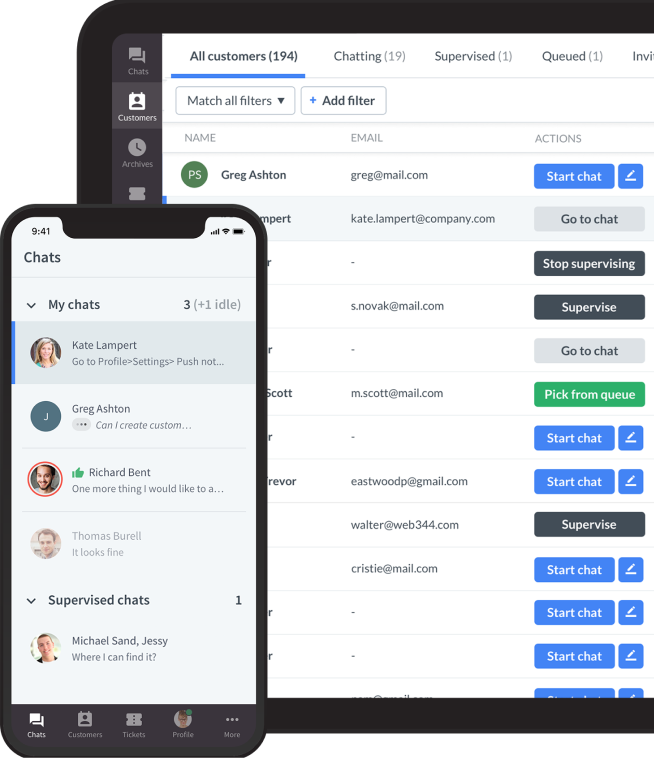
Customer-centricity is not just a slogan that gives the illusion you care about customer service. It is a mindset that should be nurtured and communicated throughout an organization. It requires a deliberate effort to prioritize the customer in every decision and action.
Without being customer-centric, there can be no seamless and high-quality customer experience. This article will cover the benefits of adopting a customer-centric approach using personalized experience and customer insights.
Benefits of using customer insights
Using customer insights to guide your strategic and tactical decisions, you can foster stronger relationships with loyal customers, better grasp what your customers want, and achieve significant and measurable outcomes. The benefits of using customer insights include:
-
Enhanced customer lifetime value.
-
Decreased customer churn – with the aid of appropriate data, you can pinpoint areas that need improvement in customer service to offer your customers better satisfaction.
-
Customized promotions – the ability to create promotions that are customized to your customers who are most likely to make a purchase.
-
Optimized pricing – more effective optimization of your product pricing through better comprehension of the market.
-
Expanded markets – the intelligence required to expand into new markets or withdraw from underperforming markets.
Customer data and understanding the customer
Customer data is crucial for developing a thorough understanding of customers. However, significant discussion remains about how to collect and then use customer data.
Brands must be open about the data they gather and how it impacts the user. Procedures must be in place to ensure consistent compliance and authentication across departments.
Bad data can limit the effectiveness of insights derived from the data at best and can lead to a broken user experience at worst. To become data-driven, it is crucial to have high-quality information that you can rely on to inform your strategies and initiatives.
Many customer-centric organizations are using big data analytics to develop a framework of principles and capabilities for effective data management. While some companies have large data pools to handle vast amounts of information, others rely on cloud warehouses to do the same.
However, if your brand's data pool is significantly smaller, don't worry. The principles for managing data are still applicable regardless of the technology stack or the size, frequency, or complexity of business processes.
The digitization trend has led many businesses from various industries to move online, increasing the need for powerful data analysis due to the significant rise in data volumes.
As more organizations recognize the importance of collecting data, enriching it with relevant content, breaking down silos, and making actionable insights easily accessible, there will be a higher demand for intelligent customer engagement platforms. To choose the right platform, it is crucial to understand its detailed capabilities.
The importance of treating customers as individuals
Every customer is different and deserves to be treated as such. In the world of marketing, customer experience is the most critical factor. Personalization is the key to enhancing customer experience. By customizing the experience to the preferences of each individual, businesses can achieve remarkable success in meeting the needs of their customers.
To treat customers as unique individuals, you must consider them as such. Even if a whole customer base belongs to a more significant segment than thousands of others, brands need to treat each one as an individual. It doesn't mean they are identical because they share similarities with others in the same segment group.
They may differ substantially in certain areas, such as their favorite car brand preference or political views. It all depends on the initial segmentation exercise, how detailed it was, and what factors the brand chose to differentiate on.
What are personalized customer experiences?
Personalization is gathering relevant user data respectfully and utilizing that data throughout the marketing and sales funnel. Personalization strategy can take on various forms, each varying in complexity and impacting the customer experience.
For instance, including customer names in an email subject line is an example of a personalized customer experience. Spotify Wrapped, an annual campaign by Spotify where they share a compilation of each listener's top artists, songs, genres, and more in a shareable graphic, is an excellent example of mid-tier personalization used for marketing.
On the other hand, Strava's recommendations offer suggested activities and challenges based on past activities, demonstrating how these personalization efforts can drive usage and retention.
On the more complex side, brands can create fully contextualized customer experiences across a sequence of user interactions. For example, an ecommerce company might personalize a shopper's catalog recommendations based on recent purchase history, browsing, or search behavior.
The benefits of the customer-centered approach
Combining a customer-centered approach with digital marketing is especially effective for improving client retention and bottom line.
More business referrals
Referrals from friends increase the likelihood of a purchase by four times. Encourage your clients to refer others. They will be more likely to spread the word if you treat them like individuals, not dollars.
Client trust
Earning customer trust is crucial as it can boost your referrals and sales potential. More than 80% of customers are likely to recommend a company they trust to others. You can earn their trust by keeping your promises, respecting their time, and going the extra mile to satisfy them.
Taking a customer-centered approach to business can positively impact the long run. Combine this approach with a strategic digital marketing plan and a commitment to quality improvement, and your business will thrive.
Extending this approach to treating your partners and team members is also essential. Demonstrating that you care about their business and appreciate their contributions is a guaranteed way to run a happy and successful business.
Data privacy and transparency are essential to customer trust
According to a survey conducted by Cisco, data transparency plays the most significant role in building consumers' trust and willingness to do business with organizations. About 81% of the survey respondents believe that how a business treats personal data reflects its respect for customers.
This figure represents a 5% increase from the previous three annual studies with consistent numbers. Additionally, 39% of the respondents believe that data transparency is the most critical factor an organization can employ to build consumer trust.
Although most consumers value data transparency when interacting with organizations on social media, many feel companies do not place enough emphasis on this.
In the same survey, 43% of people still do not think companies are doing enough to protect their data online. Of these respondents, 76% stated they were unsatisfied with companies' existing data transparency policies and practices.
Many people are dissatisfied with how companies use their data, mainly due to the lack of transparency regarding data usage. People want to know exactly how businesses are using their data. The lack of trust in businesses regarding data privacy has led people to take matters into their own hands and take steps to protect their privacy.
Holistic approach to customer experience
When people talk about the customer journey, most refer to the paths consumers and end-users follow as they purchase, interact with, and react to products, brands, and customer service agents. But there's a problem with this way of thinking: it only works if every person has the same experience with your product or brand.
Furthermore, the customer journey should encompass all customer behavior and interactions with all relevant businesses and organizations – not just the people on your team. After all, your customers aren't just your customers; they're consumers and users of countless goods and services.
So, rather than focusing on streamlining your customer journey, it's essential to optimize the entire customer experience – no matter what their journey looks like.
As business ecosystems break down traditional silos between different brands and services, the customer journey is changing its shape as well. The new holistic customer experience more closely resembles a web of interactions.
Depending on the customer and their goals, customer preferences, and the channels they learn about, purchase, and receive support for products and services, it can take different paths.
Consider a holistic approach for increased customer satisfaction
Businesses must consider the complete customer journey. Here are a few reasons why.
Better and faster support resolutions
When you look at individual interactions within the context of the entire customer journey, everything starts to make more sense.
For instance, if you know what support issues a customer has experienced, who they spoke to about the problem, and what the solution was, you can save a ton of time troubleshooting the next time they reach out to your team.
Easy to find room for improvement
Companies prioritizing the entire customer journey focus on enhancing the overall customer experience rather than simply moving customers through predetermined steps.
By considering the various customer touchpoints, the impact of third-party service providers, distinct customer personas, and other factors that affect the customer experience, it is easier to identify and address potential sources of friction to improve the journey.
Customer loyalty
A great customer experience is crucial for building customer loyalty, increasing referrals, and retaining customers. A business that adopts a comprehensive approach to customer experience can inspire long-term loyalty and improve retention rates. According to Microsoft's research, 96% of consumers worldwide consider customer service a significant factor influencing brand loyalty.
Conclusion
Businesses can improve the customer journey by getting data for personalized customer insights and prioritizing data privacy and transparency.
This journey requires strategic planning and a cultural shift, where every team member understands the value of individual customers and works towards creating personalized experiences that build trust and loyalty. Ultimately, leveraging data for personalized experiences isn't just a strategy; it's a winning formula.
Get a glimpse into the future of business communication with digital natives.
Get the FREE report




